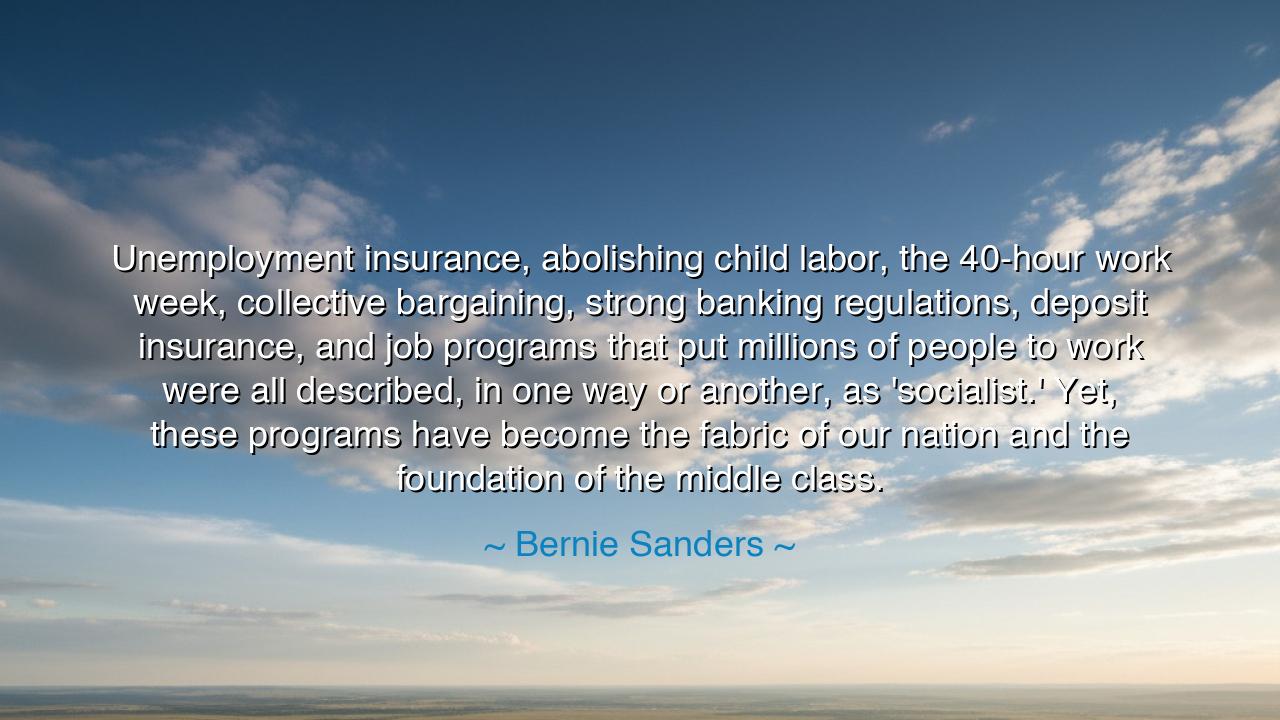
Unemployment insurance, abolishing child labor, the 40-hour work
Unemployment insurance, abolishing child labor, the 40-hour work week, collective bargaining, strong banking regulations, deposit insurance, and job programs that put millions of people to work were all described, in one way or another, as 'socialist.' Yet, these programs have become the fabric of our nation and the foundation of the middle class.






The words of Bernie Sanders, “Unemployment insurance, abolishing child labor, the 40-hour work week, collective bargaining, strong banking regulations, deposit insurance, and job programs that put millions of people to work were all described, in one way or another, as ‘socialist.’ Yet, these programs have become the fabric of our nation and the foundation of the middle class,” ring as a reminder of how great reforms, once scorned, become the pillars of a people’s life. He names the struggles of the past, when each safeguard of dignity was resisted and ridiculed, yet endured to shape a fairer society.
The mention of unemployment insurance and the end of child labor points to the battles waged to protect the vulnerable. In ages before, the poor were left to starve, and children were chained to the wheel of industry. What was once defended as freedom for the powerful was in truth bondage for the powerless. Only through struggle did these reforms take root, despised by some as “socialist,” yet embraced at last as humane necessity.
The 40-hour work week, the right of collective bargaining, and the birth of job programs remind us that laborers did not inherit rest and fairness — they wrested it from hardship. Likewise, banking regulations and deposit insurance were not granted in times of ease, but forged amid crisis, when the collapse of trust demanded new foundations. Each reform was branded dangerous at its dawn, yet each became woven into the fabric of the nation itself.
Thus, Sanders’ words remind future generations that progress often wears the mask of controversy. What is dismissed as radical may one day become the very foundation of stability. Let this be remembered: the middle class did not spring forth fully formed, but was built brick by brick, by reforms born in struggle and preserved in hope. And so the charge endures — to guard these foundations, and to shape new ones, though they too may first be scorned.






PNPhuong Nguyen
I really agree with Bernie Sanders' point here. It shows that the policies often labeled as 'socialist' have been key to improving the lives of the working class. But it also makes me think—why is it so hard to move beyond the negative connotations of these policies? How can we have a more honest conversation about the benefits of such programs without the political rhetoric getting in the way?
LALi Alena
Bernie Sanders' quote sheds light on how certain policies that were once stigmatized as 'socialist' are now central to the middle class's success. But it also makes me wonder—why do we continue to resist similar policies today? Is the resistance due to ideological fear, or have we lost sight of the benefits these programs bring? How can we bring more people on board with progressive policies that help the majority?
DVHoang Duc Vu
I find it fascinating how Bernie Sanders points out that things like unemployment insurance and collective bargaining, which were once controversial, are now integral to the fabric of society. It raises the question—how much of our political discourse is shaped by outdated labels or fears? Could we be more open to policies that help people, even if they’re unfairly labeled as 'socialist' by certain groups?
HHhanh hong
Bernie Sanders' perspective really challenges how we view government policies. The programs he mentions, which are often viewed with suspicion or disdain, have become essential parts of our society. What does this say about the way political ideologies shape our perception of policy? Are we too quick to dismiss certain ideas as 'socialist' without fully understanding how they contribute to societal well-being?
PLPhat Le
Bernie Sanders' quote is a strong reminder of how many policies we take for granted today were once considered 'socialist.' It makes me think—why is there such a negative stigma attached to the term 'socialist' when these policies have improved the lives of millions? Could it be that the word has been politicized, even though these ideas now form the backbone of a fairer and more just society?